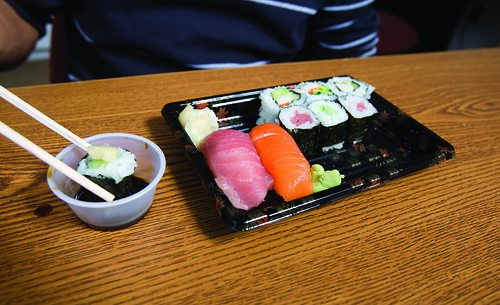Trying to lose a few extra pounds gained from all the holiday festivities? Cheesesteaks, potato chips, hot dogs and other greasy, fatty foods make it easy for students to opt for unhealthy choices, delaying weight loss and allowing them to forget their wants for a healthy lifestyle.
When looking for a healthy alternative, the answer may be Nauaji, the sushi bar located in the Student Center.
“I tried sushi because I wanted to try something new, and now, I really enjoy it,” said Max Seidman, a sophomore philosophy major.
Sushi is low in fat and contains protein and other essential nutrients.
“It provides a portion-controlled source of carbohydrates and lean meat,” said Nicole Patience, a registered clinical dietitian at Temple.
The raw fish component of sushi is high in Omega-3 fatty acids, which lower blood pressure and help prevent cardiovascular disease.
“Omega-3s have been shown to improve our good cholesterol as well as our mood,” Patience said.
Omega-3 fatty acids increase levels of HDL, the good cholesterol, and decrease the levels of LDL, the bad cholesterol, within the body. They are also linked to the prevention of Alzheimer’s disease, depression and arthritis.
For students who can’t bear the thought of eating raw fish, or for those who don’t eat meat, there’s vegetarian sushi, which provides numerous health benefits as well.
“A lot of vegetarians are keen to that taste, plus sushi is light and healthy,” said pre-pharmacy and French major Bobby Oliver, who is a vegan.

Nori, the seaweed wrapped around rice used to create sushi rolls, is full of protein, vitamins and minerals. It contains high amounts of iron, iodine, potassium, magnesium and vitamins A and C.
In fact, seaweed contains more nutrients than most vegetables.
The rice in sushi also provides many health benefits, although brown rice is considered a healthier option than white.
While there is no difference in calorie content of the two, brown rice contains more fiber, Patience said.
Both are low in calories, but brown rice contains approximately three times as much fiber as white rice. It also contains higher amounts of vitamins and minerals.
Nauaji offers several types of sushi made with brown rice, particularly in the vegetarian varieties.
“I eat the brown rice sushi and enjoy it just as much [as white rice sushi] because I know it’s healthier for me,” said Rachel Maddaluna, a freshman biology major.
For inexperienced sushi-eaters, ever wonder what that strange, green glob or pink-colored, fleshy substance in a container of sushi is? Surprisingly, these funny-looking condiments are packed with nutrients.
The green ball is wasabi, a spicy paste used to add “zing” to the meal. The pinkish substance is pickled ginger, which cleanses the palate between each piece of sushi. Wasabi and pickled ginger aid the digestion process, helping to prevent certain kinds of cancer. The combination of wasabi and pickled ginger contains vitamins, minerals and antioxidants.
Not only is sushi full of nutrients, it’s low in calories and contains a substantial amount of fiber, which makes a person feel full, Patience said.
Sashimi, a piece of raw fish that doesn’t contain rice, typically ranges from 20 to 60 calories per one ounce of fish, depending on the type.
There are potential risks for eating sushi containing raw fish that contains bacteria, parasites and other contaminants. If handled properly, it is generally safe for consumption, and more people become ill from contaminated produce than sushi.
“I wouldn’t recommend sushi for pregnant women or those with weakened immune systems, but for others, I would recommend sushi in moderation as part of a healthy diet,” Patience said.
Sushi is available at various eateries surrounding Main Campus. The Noshery at Avenue North offers different types of sushi like shrimp tempura and “make-your-own” sushi, in which the diners choose what they want in an individual roll. The Noshery also accepts Diamond Dollars.
Next time you’re faced with a healthy food dilemma, skip Burger King and choose the sushi venue instead.
Grace Dickinson can be reached at grace.dickinson@temple.edu.



i think that we should focus more on healthy eating to avoid diabetes and cardiovascular diseases,’;
Wow! This can be one particular of the most beneficial blogs We’ve ever arrive across on this subject. Basically Magnificent. I’m also a specialist in this topic so I can understand your effort.